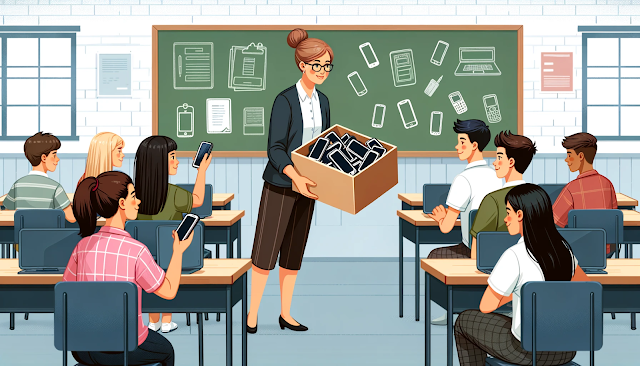The Cell Phone Ban in Schools: Two Teachers, Two Approaches
“Are you just lying to me? ”
Ashley said that the new rule sometimes led to unpleasant situations in the classroom. She gave an example:
At the beginning of the class, I asked the students to hand in all their cell phones. I noticed that Jake didn’t do it. So I said to him: “Jake, you also have to hand in your phone.” Then Jake said: “I don’t have my phone with me.” But I know he always deceives you. So you know what I did? I took out my phone and called him on the spot. And what do you think? Sure enough, his phone rang! So I said: “Are you just lying to me, Jake?” Then he made quite a scene… Saying all sorts of things like: “It’s just a stupid rule! Ridiculous!”
“You can check it!”
Ashley asked Emily if she had much hassle from students about the cell phones. When Emily said she actually had few problems, Ashley asked: “But how do you deal with such situations, when they don’t want to hand in their phones?” Emily gave an example from that morning.
This morning I asked the students to hand in their cell phones. The class started. A few minutes later, Ethan came in and sat down. I asked him to hand in his cell phone. He said he had left his cell phone at home. Unprompted, he added: “And if you don’t believe me, you can check. Feel in my pockets. I really don’t have it with me!” Then I said: “If you say you don’t have it with you, I believe you. I’m not going to check.” Then I briefly explained why cell phones are no longer allowed in class: without cell phones, it’s much easier to concentrate. I started the lesson and after a few minutes, Ethan said: “Ma’am, I do have my cell phone with me. It’s in my bag. But I promise I won’t use it.” He participated well during the class.
Reflection
Ashley and Emily's situations illustrate two rather different approaches to dealing with school rules and student behavior. Ashley, who takes a strict and somewhat distrustful approach, may inadvertently create resistance among her students. Her confrontation with Jake shows how a lack of trust can escalate into a conflict. On the other hand, Emily's story shows the power of a trusting plus explanatory approach. When she trusts Ethan and explains why the rule is important, he responds with openness and cooperation, despite his initial deception.
This illustrates how Emily's approach is psychologically more sophisticated, and more effective in promoting cooperative behavior in students. Contrary to Ashley's fears, Emily's trust does not seem to lead to abuse by the students, but rather to better acceptance of the rules and more positive interaction in the classroom. The approach based on mutual trust and clear communication about the 'why' of rules can result in a more constructive and harmonious learning environment. Ashley's hesitation, while understandable, thus seems too pessimistic in light of Emily's success.

Comments